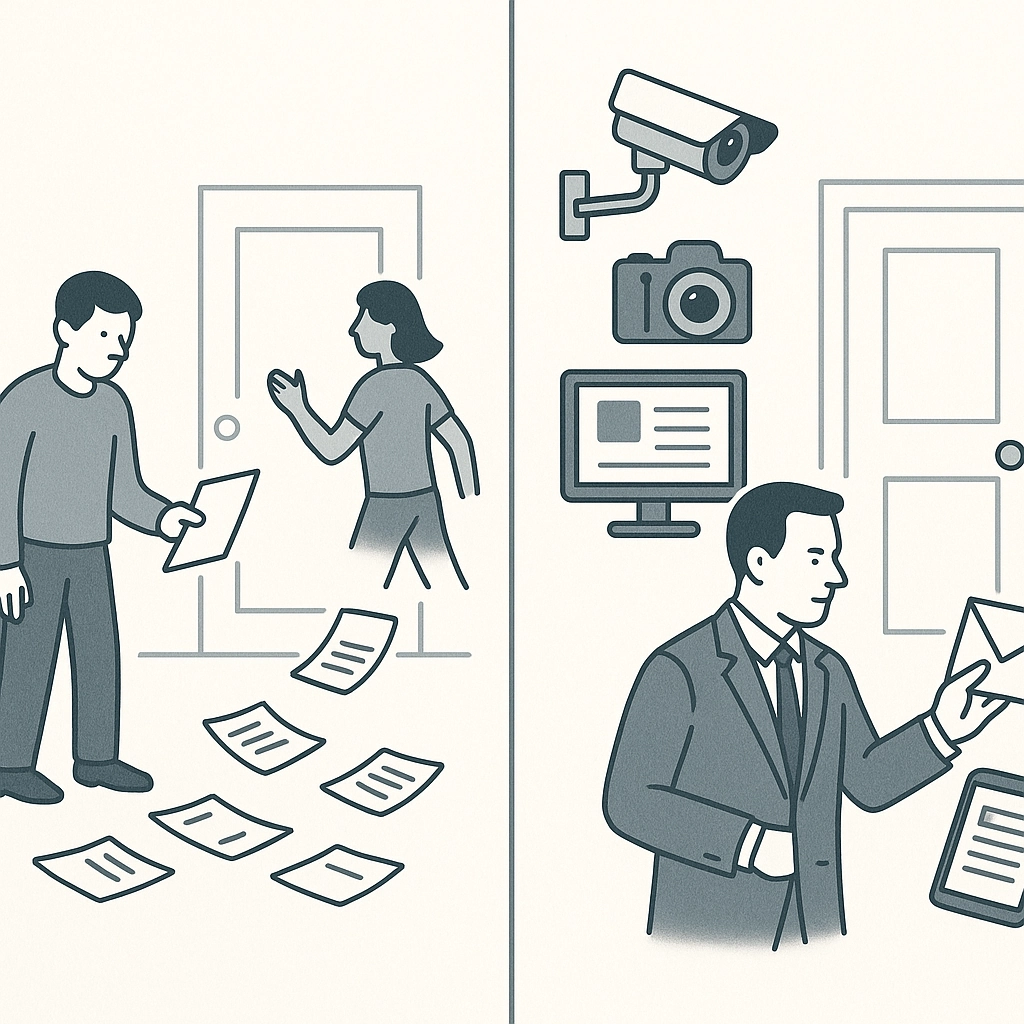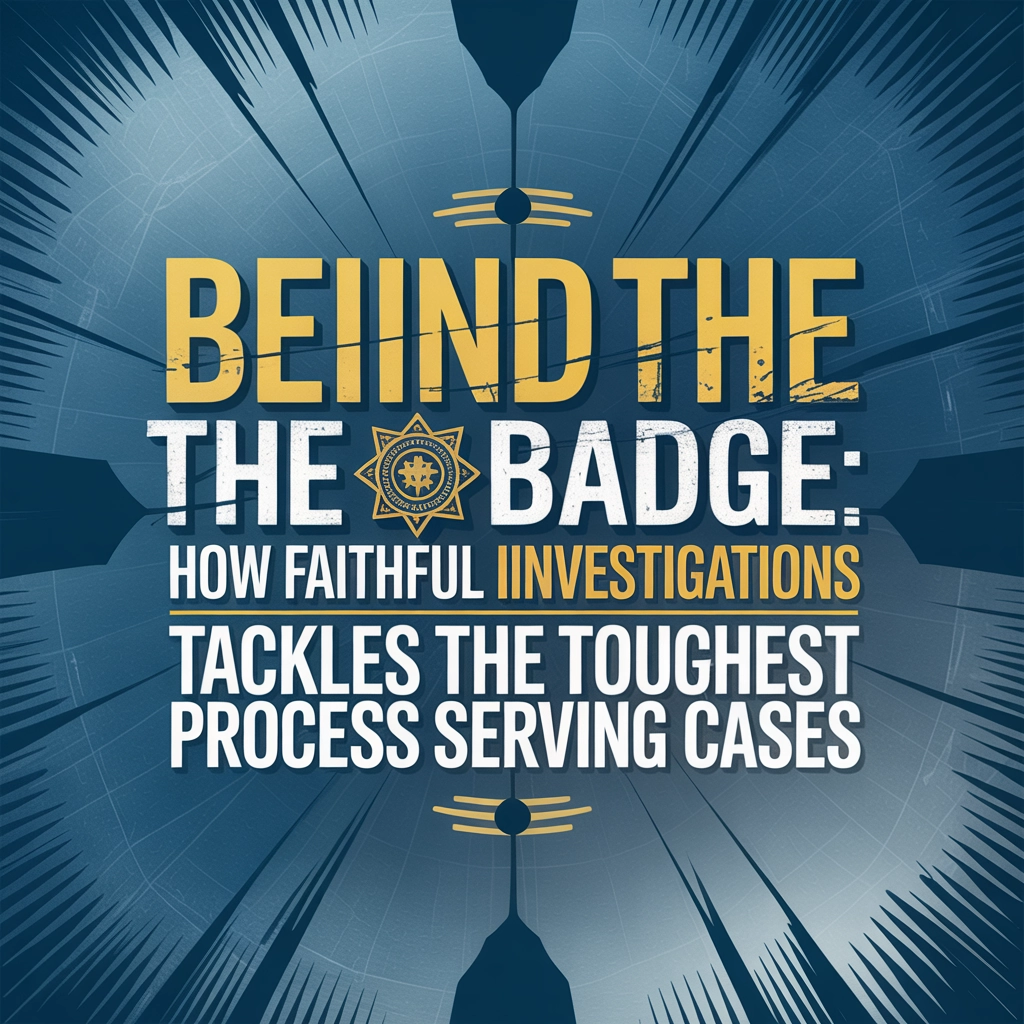The face of the moon was in shadow
When "Difficult to Serve" Meets Its Match
You've probably seen it in movies—the reluctant witness dodging papers like they're playing an Olympic sport. While Hollywood dramatizes process serving for entertainment, the reality is that getting legal documents into the right hands can sometimes feel like solving a complex puzzle. At Faithful Path Investigations, we don't just deliver papers; we overcome obstacles that would send less experienced servers packing.
Let me tell you something straight up—process serving isn't just about knocking on doors. It's about strategy, persistence, and knowing how to navigate the complex world where legal requirements meet human behavior. Today, I'm pulling back the curtain on how our team handles the cases that others mark as "impossible."
Why Process Serving Gets Complicated
Before diving into our methods, let's talk about why some cases become challenging in the first place:
The Deliberate Dodgers
Some individuals actively avoid service. They've seen the movies too and think that if papers never reach their hands, legal proceedings can't move forward. They might:
- Refuse to answer doors
- Change their schedules
- Stay with friends
- Instruct family to claim they don't live there
- Even temporarily relocate
The Genuinely Hard-to-Reach
Then there are people who aren't deliberately evading but are naturally difficult to locate:
- Those who travel frequently for work
- Individuals with irregular work schedules
- People who recently moved
- Those without permanent addresses
- Individuals in secured buildings or gated communities
The Corporate Complexity
Serving businesses presents its own challenges:
- Identifying the proper registered agent
- Navigating gatekeepers and receptionists
- Dealing with corporate structures designed to shield decision-makers
- Serving subsidiaries or parent companies correctly

The Faithful Path Difference: Our Process for the Impossible
When a client brings us a challenging case, we don't just make a few attempts and give up. We implement a systematic approach that has proven successful even with the most evasive subjects.
1. Intelligence Gathering: The Foundation of Success
Every successful serve starts with thorough research. Our investigators:
- Conduct comprehensive background checks
- Review social media profiles for patterns and locations
- Utilize specialized databases not available to the public
- Verify employment information
- Check property records and vehicle registrations
- Contact reliable sources within communities
This intelligence phase isn't just about finding an address—it's about understanding the subject's habits, routines, and networks.
2. Strategic Planning: The Chess Game
Once we have intelligence, we develop a customized strategy:
- Analyzing the best times for service based on the subject's habits
- Identifying multiple potential service locations
- Preparing alternative approaches if initial attempts fail
- Coordinating with legal teams to ensure all approaches comply with jurisdiction requirements
- Creating contingency plans for various scenarios
"The difference between amateur and professional process servers isn't just persistence—it's strategic thinking," says our lead investigator. "Anyone can knock on a door three times. We plan for success on the first attempt but prepare for a marathon if needed."
3. Adaptive Techniques: When Standard Approaches Fail
For particularly challenging cases, we employ specialized techniques:
The Surveillance Advantage
For subjects who are vigilant about avoiding strangers, surveillance allows us to:
- Identify patterns in their movements
- Discover locations they frequent beyond their home
- Determine the best timing for successful service
- Document attempts thoroughly for court purposes
The Network Approach
Sometimes, the direct route isn't the most effective. We might:
- Identify opportunities where the subject might be in public places
- Coordinate with building management for access to secured locations
- Use specialized teams for different locations simultaneously

Technology Integration
Modern tools have revolutionized difficult serves:
- GPS tracking for more efficient routing between multiple attempts
- Real-time communication between team members
- Digital documentation that meets court standards
- Specialized databases for locating subjects
Real Cases, Real Solutions (Names Changed for Privacy)
The Weekend Wanderer
The Challenge: A defendant in a significant civil case had no fixed schedule, worked remotely, and appeared to have a sixth sense for when servers were approaching.
Our Solution: After traditional methods failed, our team conducted pattern analysis and discovered the subject visited a particular coffee shop every Sunday morning. Service was completed without incident while the subject waited for their latte.
The Corporate Shield
The Challenge: A business entity needed to be served, but the registered agent address was essentially a mail drop, and company representatives refused to identify appropriate recipients for service.
Our Solution: Through research, we identified board meeting dates from public filings. Our process server was able to serve the company's CEO as they arrived for the quarterly meeting.
The Rural Recluse
The Challenge: A defendant in a property dispute lived on a large rural property with no address markers, multiple access points, and reportedly had dogs patrolling the perimeter.
Our Solution: Rather than attempting direct service at the property, we discovered through county records that the subject had an upcoming court date for an unrelated matter. Service was completed in the courthouse hallway—a perfectly legal and safe alternative.
Maintaining Legal Integrity
While we pride ourselves on creativity and persistence, we never cross legal boundaries. Every technique we employ adheres strictly to:
- Federal, state, and local laws governing process service
- Ethical standards of professional investigators
- Privacy protections for all involved parties
- Court requirements for proper service
"The goal isn't just delivering papers," our training coordinator emphasizes. "It's delivering them in a way that ensures the service will stand up to any legal scrutiny."

How Clients Can Help
The most successful difficult serves often involve collaboration with our clients:
- Provide as much information as possible about the subject
- Share any previous service attempts and what happened
- Be realistic about timeframes for challenging cases
- Understand that documentation of attempts is critical for alternative service motions
- Remain flexible as strategies may need to evolve
When Traditional Service Isn't Possible
In those rare cases where direct personal service truly isn't possible despite our best efforts, we don't simply give up. We help clients:
- Prepare thorough documentation of all attempts for court review
- Advise on alternative service options allowed in their jurisdiction
- Assist with motions for service by publication or posting
- Identify other legal avenues to move their case forward
The Faithful Path Promise
At Faithful Path Investigations, we believe that "difficult to serve" doesn't mean "impossible to serve." Our team brings decades of combined experience to every case, with specialized training in handling the most challenging situations.
Our process servers aren't just couriers—they're trained investigators who understand both the legal requirements and the psychological aspects of successful service. This combination of skills allows us to succeed where others have failed.
Whether you're dealing with an evasive defendant, a complex corporate structure, or simply a case with unusual circumstances, our team is ready to find the faithful path to successful service.
Need assistance with a challenging process serving case? Contact our team today at (888) 558-4FPI or visit our contact page to discuss how we can help move your legal matter forward.
Remember—papers don't serve themselves, but with the right team, even the most difficult service becomes possible.



